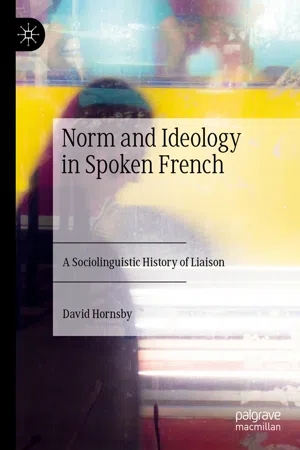1.1 Kroch’s Model of Language Variation
In a seminal article published in Language and Society in 1978, Anthony Kroch appeared to question one of the core tenets of linguistics. The axiom ‘Linguistics is descriptive, not prescriptive’ had become as much a raison d’être as a guiding principle for a discipline determined to challenge language-related prejudice. Linguists generally, and sociolinguists in particular, had been at pains to stress the equality of all varieties, and reject folk-linguistic stereotypes associated with regionally or socially defined speaker groups. So when Kroch observed, citing evidence from Labov’s famous (1966) New York City survey, that ‘prestige dialects require special attention to speech’ and ‘non-prestige dialects tend to be articulatorily more economical than the prestige dialect’ (1978: 19–20), he was acutely aware that his views could be characterised as reviving prescriptive stereotypes of ‘lazy’ working-class usage.
As he made clear, however, Kroch’s intention was not in any way to be judgmental or prescriptive. In claiming that ‘working-class
speech is more susceptible to the processes of phonetic conditioning than the
prestige dialect’ (p.18), Kroch was simply arguing that language change has an ideological component which, however inconvenient it might be, could no longer be ignored. While
working-class speech follows ‘natural’
phonetic conditioning processes,
1 higher status groups, he claimed, actively resist these same processes in order to maintain
social distinction (
1978: 30):
Our position, as stated earlier, is that prestige dialects resist phonetically motivated change and inherent variation because prestige speakers seek to mark themselves off as distinct from the common people and because inhibiting phonetic processes is an obvious way to do this. Thus, we are claiming that there is a particular ideological motivation at the origin of social dialect variation. This ideology causes the prestige dialect user to expend more energy in speaking than does the user of the popular vernacular.
Presenting evidence from a range of studies, Kroch cites three examples of phonetic change, namely (i) consonantal
simplification (ii) vocalic processes of chain shifting and (iii)
assimilation of foreign phonemes to a native pattern, all of which, he argues, are further advanced in non-standard varieties. Among higher status groups, by contrast, resistance to such linguistic processes demands a particular effort ‘motivated not by the needs of communication but by status consciousness’ (p. 19), which procures
social advantage for the user. Linguistic
conservatism on the part of
elite groups, viewed by Kroch as the embodiment of their ideological value-system, had also been observed by Bloomfield (
1964 [1927]: 393–94) half a century earlier:
These dialects are maintained by social elites and such elites are by and large conservative. The use of conservative linguistic forms is for them a symbol of their whole value system. From this standpoint the conservatism of the literary language has basically the same source as that of the spoken prestige dialect, since the standards of the literary language are set by the elite.
Kroch’s emphasis on the ideological dimension has been challenged in recent years by commentators who associate linguistic conservatism not with ideology, but with isolation (see especially Trudgill 1992, 2011). Isolation may even promote the very opposite of the simplifying changes Kroch associates with low-status speakers. Milroy and Margrain (1980), for example, highlight the exceptional phonological complexity of the working-class vowel system of English in Belfast, a relatively peripheral city within the United Kingdom in which close-knit communities inhabit what Milroy (1980) describes as ‘urban villages’. Andersen (1988) has noted the prevalence of ‘exorbitant phonetic developments’ in isolated communities, such as kugv (‘cow’) /ku:/ > /kigv/ in Faroese (see Trudgill 2011: 153), which again appear to run counter to the expectations of Kroch’s model. One can also, moreover, point to counter-examples within the evidence which Kroch himself cites. He notes, for example, that /r/-deletion in New York is a simplifying change which, according to Labov’s (1966) evidence, is both further advanced among working-class speakers and stigmatised by elite groups. Within England, however, the pattern is reversed: the prestige accent RP (Received Pronunciation) is notably non-rhotic, while some low-status varieties retain non-prevocalic /r/; similar remarks apply to ‘happy-tensing’ in many British English varieties, where replacement of a lax unstressed final vowel by a tense one results in increased articulatory effort. But Kroch is careful not to claim that ‘regular phonological processes can all be reduced to simplification of some sort’ (p.23, fn. 9), and among the ‘established prestige dialects’ to which he restricts his remarks, his model has a clear and obvious relevance to the case of standard French, a language which has probably seen more rigid top-down codification than any other.
